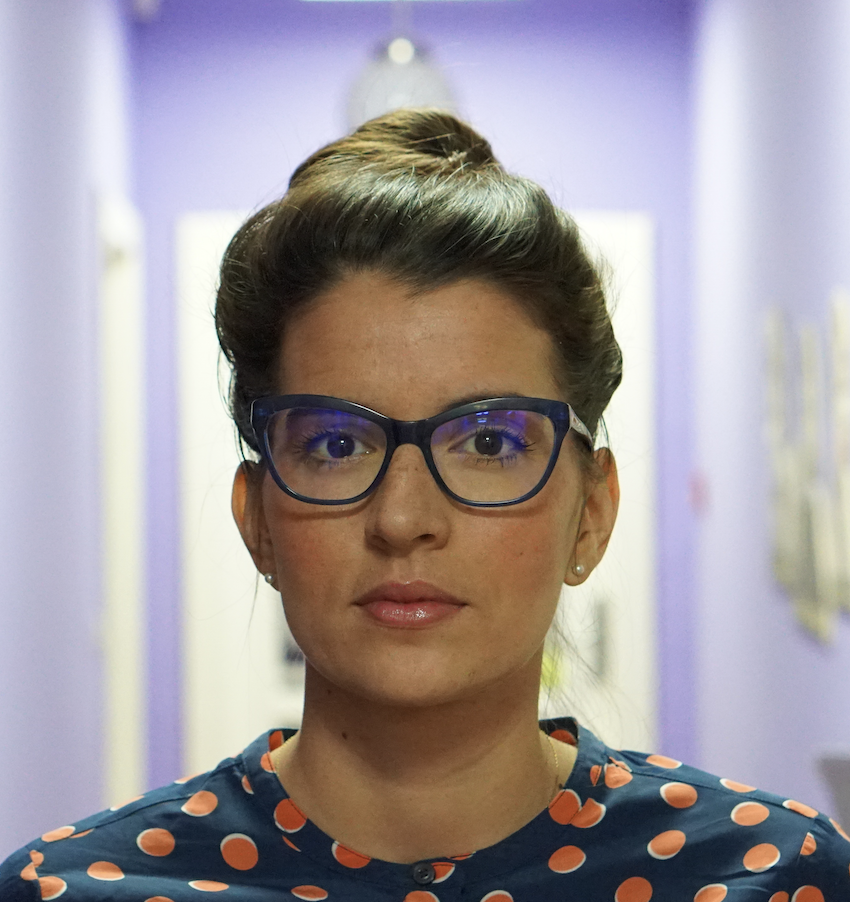This week, as part of our new interview series, “Portraits of FoE Defenders,” Marija Šajkaš, CGFoE’s Senior Communications Manager, speaks to media lawyer Nevena Krivokapić Martinović about the Price Moot Court, its partnership with CGFoE, and the state of digital rights in Serbia.
Nevena Krivokapić Martinović is a Serbia-based media lawyer and Freedom of Expression and Online Media Coordinator at the SHARE Foundation, focusing on human rights in the digital environment. Since 2013, she has served as Moot Coordinator of the Monroe E. Price Media Law Moot Court Competition at the University of Oxford. Her interest in media law began in 2011, when she was part of the University of Belgrade team that won the Price Moot Court.

Nevena Krivokapić Martinović is a Serbia-based media lawyer, focusing on human rights in the digital environment. Photo: courtesy of Nevena Krivokapić Martinović.
Marija Šajkaš: You were among the first competitors at Price Moot. Could you tell us more about the early days of the competition? How did you prepare for the rounds?
Nevena Krivokapić Martinović: I was part of the early teams at the Price Moot International Rounds in Oxford in 2011, when the competition was still finding its shape. At the time, coming from the University of Belgrade, we had no previous knowledge of freedom of expression and human rights. On top of that, we did not have many of the structured resources that exist today. Our preparation mostly involved independent research, long sessions with academic texts, and mock pleadings amongst ourselves. Despite the limitations, however, there was a strong sense of purpose: We knew we were engaging with legal questions that had real-world significance and were about to become highly relevant.
Has the competition changed much since that time, and if so, in what ways?
Absolutely. Price Moot has grown tremendously in scope and sophistication. From a relatively small gathering, it has matured into a truly global platform that brings together diverse perspectives and legal traditions. From the South Asia Regional Round, which started as the first one in a row, we managed to develop 6+ Regional Rounds all around the world. The cases now involve cutting-edge questions about digital rights, algorithms, artificial intelligence, mass biometric surveillance, and cross-border speech, reflecting the evolving nature of media law. The competition format itself has expanded with, as I’ve stressed, more regional rounds, but also mooting master classes, different events around the moot, and far more.
How do you see the role of the competition today, especially in training future human rights lawyers?
The competition plays a critical role in building the next generation of human rights lawyers. This year, at the beginning of International Rounds, we emphasized that fighting for freedom of expression these days is more relevant than ever. While being with peers from all over the world, students learn to think critically, argue with nuance, and consider competing values. Most importantly, Price Moot offers a space where young lawyers can engage deeply with freedom of expression issues and develop a truly global legal literacy—an essential skill in today’s interconnected world and digital environment.
The fictional cases in the competition are often modeled on real-world scenarios and reflect ongoing global legal tensions. What were some of the key topics teams debated this year?
This year’s case featured timely and complex issues: the takedown of controversial online content, encrypted communication and state surveillance, and the regulation of platform algorithms. These topics closely mirror current debates—happening globally: in courts and on the Internet—but are usually one step ahead as well. This makes the competition feel especially impactful.
Price Moot is uniquely focused on freedom of expression, media law, and digital rights. Many participants rely on CGFoE’s Case Law Database when preparing arguments. How important are resources like CGFoE for teams and coaches during the competition?
Invaluable. The CGFoE Case Law Database gives teams access to a wide range of judgments from multiple jurisdictions, helping them build arguments grounded in real jurisprudence. It also supports coaches in guiding students through complex legal principles. For many teams—particularly those from under-resourced institutions—this access levels the playing field and enhances the quality of their advocacy.
In what way has CGFoE supported the Moot Court over the years?
CGFoE has been a long-term partner to the Moot. Beyond offering research resources, they’ve provided judges, supported our Regional Rounds, and conducted projects that involved many students and coaches. CGFoE’s commitment to fostering free expression through education and dialogue has made a lasting impact on the competition and its community.
The partnership goes both ways. Many Price Moot alumni are now CGFoE legal researchers and experts. What are your hopes for future collaboration between Price Moot and CGFoE?
I hope this relationship will continue to deepen and expand. The natural overlap between the Moot’s mission and CGFoE’s work offers countless possibilities—from co-developing educational resources to organizing alumni-led workshops and expanding global access to jurisprudence. Together, we can ensure that Price Moot not only trains excellent advocates but also continues to build a global movement for the protection of freedom of expression.
In your daily life, you work at the SHARE Foundation in Serbia as its Coordinator for freedom of expression and online media. What are some issues you face?
The current political climate in Serbia is very intense and has impacted our daily work. In recent months, the most alarming developments in the country involve the use of spyware, particularly targeting journalists and activists, mostly connected with ongoing protests that have been happening since December 2024. Recently, we presented a report marking 10 years of monitoring digital rights violations. The report offers a clear view of how the landscape has evolved over the past decade.

